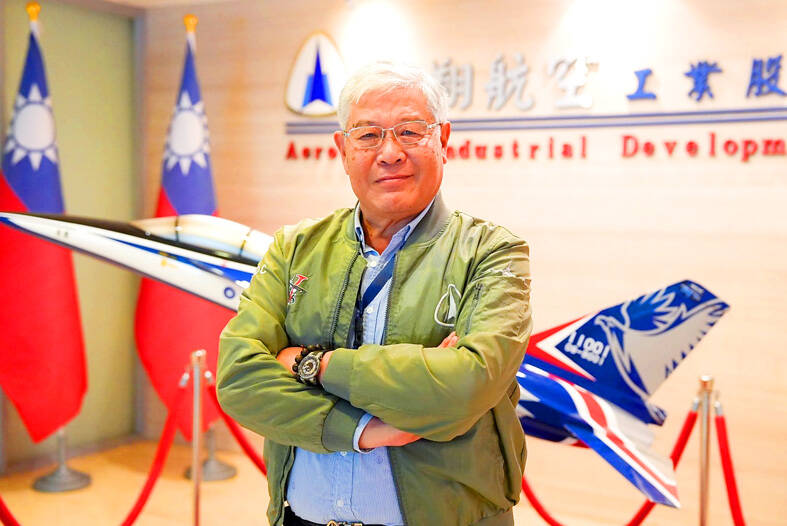Taiwan is bringing together dozens of drone companies to forge a drone production supply hub capable of making its mark in global markets, Aerospace Industrial Development Corp (AIDC) president Ma Wan-june (馬萬鈞) said.
Ma was referring to the Taiwan Excellence Drone International Business Opportunities Alliance, a Ministry of Economic Affairs-supported Taiwanese drone supply chain alliance led by AIDC. The ministry has a 35 percent stake.
The alliance is comprised of about 50 drone-related companies including AIDC, aircraft maintenance services provider Air Asia Co, drone brand Thunder Tiger Corp, Coretronic Intelligent Robotics Corp, Geosat Aerospace & Technology, Evergreen Aviation Technologies Corp and contract electronics maker Qisda Group.

Photo: CNA
AIDC chairman Hu Kai-hung (胡開宏), an AIDC board member who represents the ministry, heads the new group.
“Before the establishment of the alliance, Taiwan’s drone industry only had individual companies acting independently without any coordination,” Ma said in a recent media interview. “Now, it has moved to consolidate the sector’s resources and lead the sector forward.”
Taiwan has more than 100 drone-related companies, consisting of tier one system operators, tier two module producers and tier three component suppliers, Ma said.
That would be instrumental in supporting a strong supply chain capable of rolling out fuselages, power systems, flight controls, GPS antenna modules, camera lens modules, radar, uncrewed aircraft system integration, drone ground control stations, software, and assembly and testing services, he said.
AIDC, which produces parts for Airbus, Boeing and Bombardier, and is involved in developing military aircraft for Taiwan, would take a leading role in harnessing the potential of that supply chain, Ma said.
It would be responsible for building the Taiwan drone supply hub while “helping Taiwanese companies enter the global drone supply chain and sell their products on the global market,” he added.
To that end, AIDC signed a memorandum of understanding (MOU) on drone cooperation in June with US-based defense industry firm AEVEX Aerospace, which hopes to establish access to hardware, software and logistical support from Taiwanese aerospace suppliers, Ma said.
The drone alliance has also signed MOUs on drone cooperation with Latvia, Poland and Lithuania, as well as the US state of Oklahoma, a key US hub for the drone industry.
In September, executives from 26 US drone manufacturers visited Taiwan and held talks with public agencies, private companies and academia on partnerships in drone development.
American Institute in Taiwan Director Raymond Green said the US and Taiwan were “well-positioned” to partner in the field, because of the US’ strengths in AI research and development, and Taiwan’s leadership in semiconductor manufacturing.
Ma said that China is a formidable competitor in the field, with Shenzhen-based DJI leading the way with about a 70 percent share of the global consumer drone market and with its products also being used for military purposes.
However, Ma said he was not afraid of China’s dominating presence in the sector or its economies of scale because of the operational flexibility of Taiwan’s small and medium-sized enterprises (SMEs).
Taiwanese companies are good at producing affordable and high-quality products, because of their ability to innovate and develop various payload applications, Ma said.
AIDC is well prepared to assist Taiwan’s SMEs in areas ranging from production expansion, funding and materials management, to quality control and production line development, helping them to secure orders, he added.

The Coast Guard Administration (CGA) yesterday said it had deployed patrol vessels to expel a China Coast Guard ship and a Chinese fishing boat near Pratas Island (Dongsha Island, 東沙群島) in the South China Sea. The China Coast Guard vessel was 28 nautical miles (52km) northeast of Pratas at 6:15am on Thursday, approaching the island’s restricted waters, which extend 24 nautical miles from its shoreline, the CGA’s Dongsha-Nansha Branch said in a statement. The Tainan, a 2,000-tonne cutter, was deployed by the CGA to shadow the Chinese ship, which left the area at 2:39pm on Friday, the statement said. At 6:31pm on Friday,

The Chinese People’s Liberation Army Navy’s (PLAN) third aircraft carrier, the Fujian, would pose a steep challenge to Taiwan’s ability to defend itself against a full-scale invasion, a defense expert said yesterday. Institute of National Defense and Security Research analyst Chieh Chung (揭仲) made the comment hours after the PLAN confirmed the carrier recently passed through the Taiwan Strait to conduct “scientific research tests and training missions” in the South China Sea. China has two carriers in operation — the Liaoning and the Shandong — with the Fujian undergoing sea trials. Although the PLAN needs time to train the Fujian’s air wing and

The American Institute in Taiwan (AIT) put Taiwan in danger, Ma Ying-jeou Foundation director Hsiao Hsu-tsen (蕭旭岑) said yesterday, hours after the de facto US embassy said that Beijing had misinterpreted World War II-era documents to isolate Taiwan. The AIT’s comments harmed the Republic of China’s (ROC) national interests and contradicted a part of the “six assurances” stipulating that the US would not change its official position on Taiwan’s sovereignty, Hsiao said. The “six assurances,” which were given by then-US president Ronald Reagan to Taiwan in 1982, say that Washington would not set a date for ending arm sales to Taiwan, consult

A Taiwanese academic yesterday said that Chinese Ambassador to Denmark Wang Xuefeng (王雪峰) disrespected Denmark and Japan when he earlier this year allegedly asked Japan’s embassy to make Taiwan’s representatives leave an event in Copenhagen. The Danish-language Berlingske on Sunday reported the incident in an article with the headline “The emperor’s birthday ended in drama in Copenhagen: More conflict may be on the way between Denmark and China.” It said that on Feb. 26, the Japanese embassy in Denmark held an event for Japanese Emperor Naruhito’s birthday, with about 200 guests in attendance, including representatives from Taiwan. After addressing the Japanese hosts, Wang